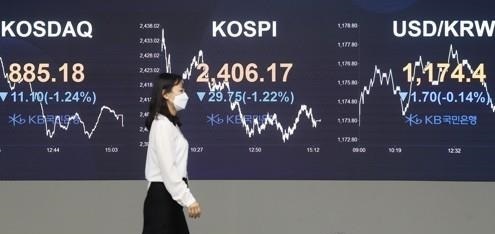 |
Electronic signboards at the trading room of KB Kookmin Bank in Seoul, show that the benchmark Kospi closed at 2,406.17 on Thursday, down 29.75 points or 1.22 percent from the previous session's close. (Yonhap) |
The amount of money local retail investors have poured in the local and overseas stock markets has reached more than 100 trillion won ($85.2 billion), according to data released by the nation’s sole securities operator Korean Exchange on Thursday.
Individual traders bought a total of 55.9 trillion won in the local market this year as of Wednesday. Of the total, 43.5 trillion won went to the main bourse Kospi, and the rest, or 12.4 trillion won, to the tech-heavy Kosdaq. Investor deposits at stock trading firms stood at 56.7 trillion won, up from 27.4 trillion won late last year.
In March, when fears of the coronavirus pandemic reached a crescendo in the global economy, foreign investors unloaded a massive amount of stocks while the legion of small investors became net buyers.
Those retail investors have also made a bold move to invest in overseas stocks during the pandemic, data showed. They collectively purchased a whopping $13.5 billion, up from $1.5 billion in 2017, $1.6 billion in 2018, and $2.5 billion in 2019. The increased purchase of foreign stocks reflects individuals’ growing interest in foreign markets, according to market watchers.
They bought some 1 trillion won worth of electric vehicle maker Tesla’s shares, among others, in the past month.
Although the stock market has rebounded from its lows earlier this year, overvaluation of stocks driven by market liquidity could lead to increased risks, some market experts said.
“If coronavirus vaccines are successfully developed as anticipated by the end of this year, it would be a good signal for the market,” said Rhee Chang-yong, director of the Asia and Pacific Department at the International Monetary Fund. “If not, the stock market could undergo a big correction.”
Market bellwether Samsung Electronics has been one of the domestic stocks largely favored by retail traders during the ongoing pandemic. As a result, those individuals are expected to play as important a role as those institutional investors.
The individuals bought some 147 million Samsung shares this year while domestic institutional investors net sold 73 million shares. Individual investors, as a result, is estimated to currently own 6.1 percent of the company, up from 3.6 percent at end-2019. The institutional investors, on the other hand, is thought to hold a 7.5 percent stake of Samsung, down from 8.7 percent from late last year.
“Although the proportions could vary slightly depending on shares held by foreign investors, individual investors certainly have more influence on the Samsung stock now than before,” a market watcher said.
By Kim Young-won (
wone0102@heraldcorp.com)








